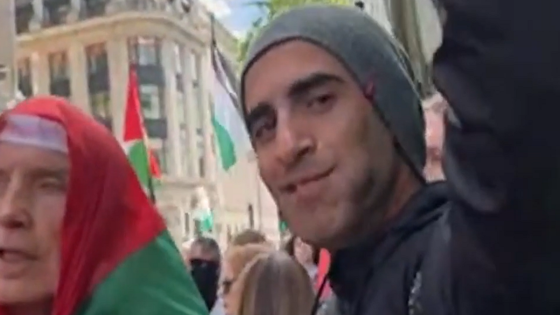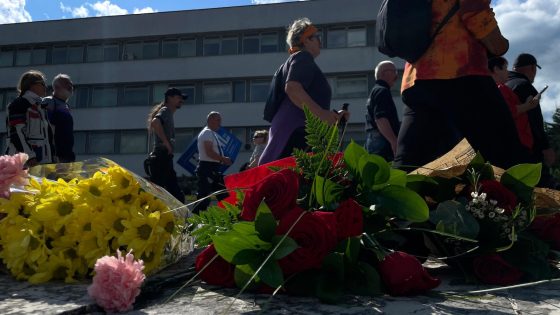Israel’s Prime Minister Benjamin Netanyahu has dissolved his six-member war cabinet, a widely expected decision that follows the departure of centrist opposition leader Benny Gantz and his ally Gadi Eisenkot.
Israeli media report that sensitive issues about the war with Hamas in Gaza will now be decided by a smaller forum.
Since Mr Gantz quit eight days ago over what he said was the lack of strategy for the war, there have been calls from far-right ministers to take his place.
By dissolving the war cabinet, Mr Netanyahu avoids a tricky situation with his coalition partners and international allies.
A spokesman for the Israel Defense Forces (IDF) said that, as far as it was concerned, it would not affect the chain of command.
Mr Gantz and Mr Eisenkot joined a national unity government with Mr Netanyahu’s right-wing coalition days after the start of the war in October.
The two former IDF chiefs of staff announced their resignations on 9 June, with Mr Gantz saying that the prime minister’s leadership was “preventing us from approaching true victory”.
Immediately afterwards, far-right National Security Minister Itamar Ben-Gvir said he had written to Mr Netanyahu to demand that he be added to the war cabinet.
On Sunday night, Mr Netanyahu reportedly informed ministers that he had decided to dissolve the decision-making body rather than bring in new members.
“The [war] cabinet was in the coalition agreement with Gantz at his request. As soon as Gantz left – there is no need for a cabinet anymore,” he said, according to the Jerusalem Post.
Haaretz reported that some of the issues previously discussed by the war cabinet would be transferred for discussion in the 14-member security cabinet, which includes Mr Ben-Gvir and fellow far-right Finance Minister Bezalel Smotrich.
It said sensitive decisions would be addressed in a “smaller consultation forum”, which was expected to include Defence Minister Yoav Gallant, Strategic Affairs Minister Ron Dermer and the chairman of the ultra-Orthodox Shas party, Aryeh Deri. The three men were in the war cabinet along with the prime minister, Mr Gantz and Mr Eisenkot.
The IDF’s chief spokesman, Rear Admiral Daniel Hagari, insisted on Monday that such moves would not affect its operations.
“Cabinet members are being changed and the method is being changed. We have the echelon, we know the chain of command. We’re working according to the chain of command. This is a democracy,” he told reporters.
The Israeli military launched a campaign in Gaza to destroy Hamas in response to an unprecedented attack on southern Israel on 7 October, during which about 1,200 people were killed and 251 others were taken hostage.
More than 37,340 people have been killed in Gaza since then, according to the territory’s Hamas-run health ministry.
There have been further signs of strain in the Israeli government in the past day, with Mr Netanyahu and his far-right ministers criticising a decision by the IDF to introduce daytime “tactical pauses in military activity” near the southern Gaza city of Rafah to allow more deliveries of humanitarian aid.
The pauses are meant to allow lorries to collect aid from the Israeli-controlled Kerem Shalom border crossing, south-east of Rafah, and then travel safely to reach the main north-south road inside Gaza. Supplies have been held back at the crossing point since Israel began an operation in Rafah last month.
But Mr Ben-Gvir decried the policy as foolish, while Israeli media quoted Mr Netanyahu as saying: “We have a country with an army, not an army with a country.”
The IDF responded by saying that the pauses did not mean the fighting in southern Gaza would stop, which created confusion over what exactly was happening on the ground.
The UN agency for Palestinian refugees (Unrwa), which is the largest humanitarian organisation in Gaza, reported that fighting was continuing in Rafah and elsewhere in the south on Monday and that “operationally nothing has changed yet”.
The IDF meanwhile said that its troops were “continuing intelligence-based, targeted operations in the area of Rafah”. It added that they had located weapons, struck structures rigged with explosives and eliminated “several terrorists” in the Tal al-Sultan area.
With little sign of progress towards a full ceasefire in Gaza, there have been new warnings from the Israeli military that the lower-level conflict with the Lebanese armed group Hezbollah is now threatening to spiral into a wider war.
Following a recent intensification in exchanges of fire, a key US diplomat is returning to the region to try to reduce tensions on the Israel-Lebanon border.
Source Agencies




